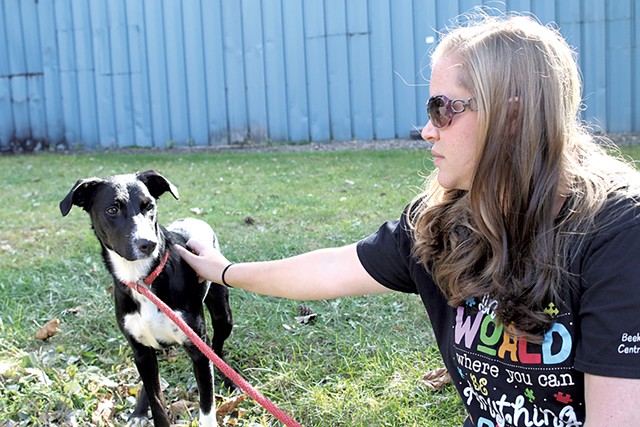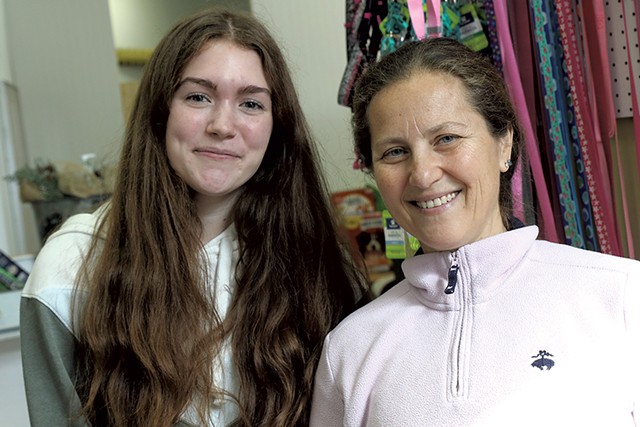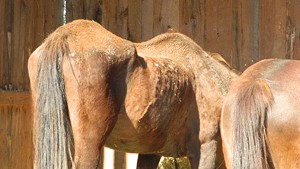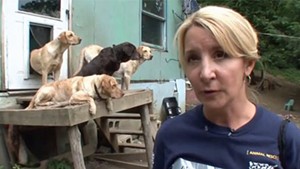
- Courtney Lamdin
- Sasha with Alexis Roberts
Sasha was a little shy. The 6-month-old border collie mix stood as far back as her red leash would allow, her ears slightly folded back. Her eyes darted between two people crouched nearby, on alert each time they patted her soft black head.
Sasha had just arrived at A Canine Gem animal rescue organization in Winooski from Puerto Rico, where she'd been found living on the streets. The pooch had been in Vermont just a week when Craig and Alexis Roberts, a couple from West Chazy, N.Y., saw her on Petfinder, an online adoption site. It would be another hour — after two walks and lots of treats — before the pup warmed up to her new owners.
While A Canine Gem wins praise for finding homes for more than 300 dogs like Sasha every year, it is also one of several Vermont animal shelters accused in the past of inadequately caring for rescued pets. Vermont provides almost no oversight of animal shelters and rescue groups. There's not even an official tally of how many such organizations operate in the state. So this fall, an advisory board plans to present state lawmakers with a set of oversight measures that members say will protect pets — and their adopters.
Today, animal shelters and rescue organizations don't have to register with the state. Unlike restaurants and daycare centers, they aren't subject to regular inspections. Short of citing an owner for animal cruelty, there aren't many remedies to address problems with poorly run shelters. Animal advocates in Vermont worry that the state's lax laws open the doggy door for trouble.
"Whenever you allow something to go unseen and exist in the dark, you're very likely to have ... some very big problems," said Barry Londeree, Vermont director for the Humane Society of the United States. "It makes sense to have eyes on those types of operations preventatively, rather than waiting for something bad to happen."
The 10 members of the Animal Cruelty Investigation Advisory Board would agree. Formed in 2016, the panel is tasked with identifying ways to improve enforcement of laws against animal cruelty and neglect.
At the state police barracks in Williston last week, the board — including two veterinarians, two humane society representatives, a state trooper, a game warden, a deputy state's attorney, a dog breeder and others — brainstormed what new laws would be most palatable to lawmakers when they reconvene in January. The first idea: Add animal rescue operators to the list of 50-plus professions that are licensed by the Vermont Secretary of State's Office of Professional Regulation. And the second: Clearly define who can investigate allegations of animal abuse.
"Most people would be surprised that there really is no state support for shelters, rescues, anyone," said Londeree, who will lobby for the board's proposals in Montpelier. "It's going to take some effort to convince the legislature that the state needs to take some responsibility for this."
The advisory board sees the Office of Professional Regulation as a natural fit, since it already licenses workers ranging from auctioneers to acupuncturists. The office can investigate complaints and penalize licensees for unprofessional conduct.
Jessica Danyow, the advisory board's chair and the executive director of Addison County's Homeward Bound humane society, thinks rescue organizations and shelters like hers should be subject to at least that much scrutiny. Many animal welfare organizations are nonprofits, which lends them some credibility, but Danyow says that "just relying on a tax classification has no bearing on how the animals in that rescue are cared for."
Until 2016, the Vermont Agency of Agriculture, Food and Markets maintained a registry of all rescue organizations. But the agency found its inspection protocol "didn't really accomplish very much" since staff didn't have enforcement authority, said state veterinarian Kristin Haas, a member of the advisory board. The legislature nixed the registry and never made another agency the list-keeper, leaving a Great Dane-size hole in the state's animal welfare laws.
Rep. Barbara Rachelson (D-Burlington) said consumers assume that pet care facilities are regulated. She introduced a bill during the last legislative session that would have accomplished much of what the advisory board is now pushing, but it did not advance.
"You could open [a rescue] up in your house and abuse the animals, and no one would know," Rachelson said. "We're the outlier."
In Danyow's view, all animal care facilities should have to adopt certain protocols before they can earn a seal of approval. She suggested that the state legislate minimum kennel sizes, require that rescue groups place only healthy animals for adoption and make sure shelters have a return policy in case the new pet owners change their minds. Danyow says she's heard too many horror stories.
In testimony to the legislature earlier this year, Danyow referenced, among others, A Canine Gem. In May 2018, police in Williston cited Hilary Davis, its operator, for cruelty to animals after authorities observed urine and feces in the animals' food storage area and multiple dogs kept in a single kennel. A staffer told officers that dogfights were commonplace and that he once had to "punch a dog in the head to stun him" to break one up, according to a police report.

- Courtney Lamdin
- Isabella Beaudoin and Hilary Davis
But the state's attorney declined to prosecute the case due to lack of probable cause, Williston Police Chief Patrick Foley said. Davis agreed to find new homes for some of the dogs and to make their cages more secure to address officers' concerns, Foley said. He also urged Davis to increase supervision at the shelter.
"Everyone agreed that was the way to go," Foley said.
Davis defended her handling of the animals in her care and blamed any past problems on a former employee. She has been rescuing cats and dogs for 29 years, many from the South, where spay-neuter programs aren't social norms, she said. A licensed veterinarian signs off before they can travel north, and A Canine Gem discloses any known health issues, Davis said.
Since Davis moved her shelter to Winooski this year, local police have visited seven times and found nothing out of order, according to Winooski Lt. James Charkalis. Still, he admitted that police have limited expertise in investigating animal cruelty.
"To prove there's overt neglect going on, it's just really hard," Charkalis said.
Vermont State Police Lt. Robert Lucas said that's exactly why the state needs to refine who can investigate these claims. As it stands, Vermont law deputizes "humane officers" for the task. These include cops, game wardens, and selectboard-appointed animal control or health officers, none of whom have training specific to animal welfare. Chittenden County deputy state's attorney Sally Adams, who also serves on the advisory board, said that makes animal cruelty cases especially difficult to prosecute.
Lori Berger, an equine studies instructor at Vermont Technical College, said she saw Vermont's "appalling lack of oversight" firsthand when the state found a new home for already malnourished horses at what turned out to be a "bogus rescue" in her neighborhood. In a letter to the advisory board, Berger wrote that the horses were "walking skeletons" wading in knee-deep manure. She was shocked to learn that rescue operations are not regulated in Vermont.
"It is an open invitation to animal hoarders. All that is required is to start collecting animals and hang up a sign," Berger wrote.
Other states have tackled this problem well, according to Danyow. Colorado's Department of Agriculture promotes its animal welfare program as a model for other states. The state has authority to license and inspect any operation that adopts, breeds, boards, grooms, rescues or otherwise sells pets to the public. A 41-page rule book spells out exacting standards for indoor and outdoor facilities, including lighting, ventilation and temperature. Colorado's law also mandates minimum sizes for animal enclosures for everything from dogs and cats to guinea pigs, rats, lizards, hopping and tree frogs, and snakes. The state can inspect foster homes for rescued animals upon request.
Berger thinks Vermont should adopt similar rules but recognizes new regulations might face opposition. "There's a culture of, 'You don't tell me how to take care of my animals,'" she said. "That's a hard culture to buck."
Davis at A Canine Gem fits squarely into that category. She said she's open to hearing the advisory board's proposals but worries that more rules will make it costlier to run her business. The more burdens the state puts on rescue organizations, the harder it is to save dogs from shelters where they would be killed, she said.
"I'm definitely not for rules for everything," Davis added. "I don't need the government in my life everywhere."
Londeree, of the Humane Society, thinks most operators would actually welcome some oversight, because they don't want people cutting corners, endangering pets and giving the animal rescue business a bad name. And without some form of oversight, pet shoppers can only rely on word of mouth and social media reviews to find a reputable shelter. Even then, "a lot of the places that I know and have concerns about, you can go online and find people saying great things about them," he said.
Londeree and Danyow, the advisory board chair, think most rescue operators in Vermont are well-intentioned but may lack the resources or knowledge to take care of animals responsibly. That's why they think the state should step in: Even one bad rescue organization, Danyow said, "is too many."










Comments
Comments are closed.
From 2014-2020, Seven Days allowed readers to comment on all stories posted on our website. While we've appreciated the suggestions and insights, right now Seven Days is prioritizing our core mission — producing high-quality, responsible local journalism — over moderating online debates between readers.
To criticize, correct or praise our reporting, please send us a letter to the editor or send us a tip. We’ll check it out and report the results.
Online comments may return when we have better tech tools for managing them. Thanks for reading.